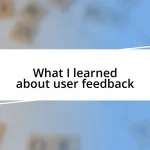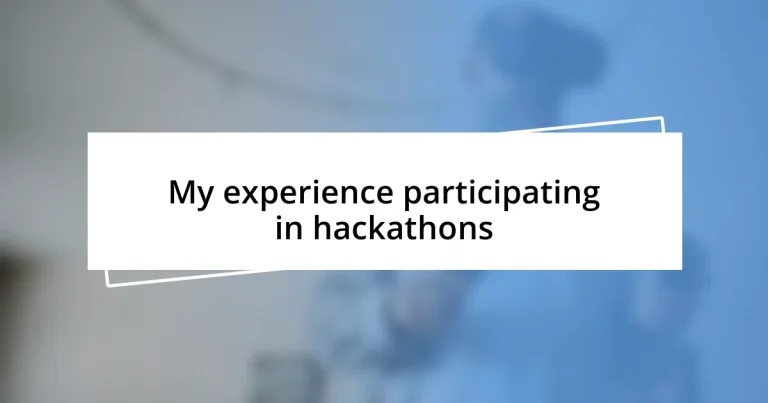Key takeaways:
- Hackathons foster collaboration and creativity, allowing participants from diverse backgrounds to learn, innovate, and build meaningful connections.
- Effective teamwork is essential; maintaining communication, leveraging individual strengths, and cultivating a positive environment can enhance productivity and morale.
- Post-hackathon reflection and networking are crucial for growth, as they provide insights for future projects and can open doors to new opportunities.
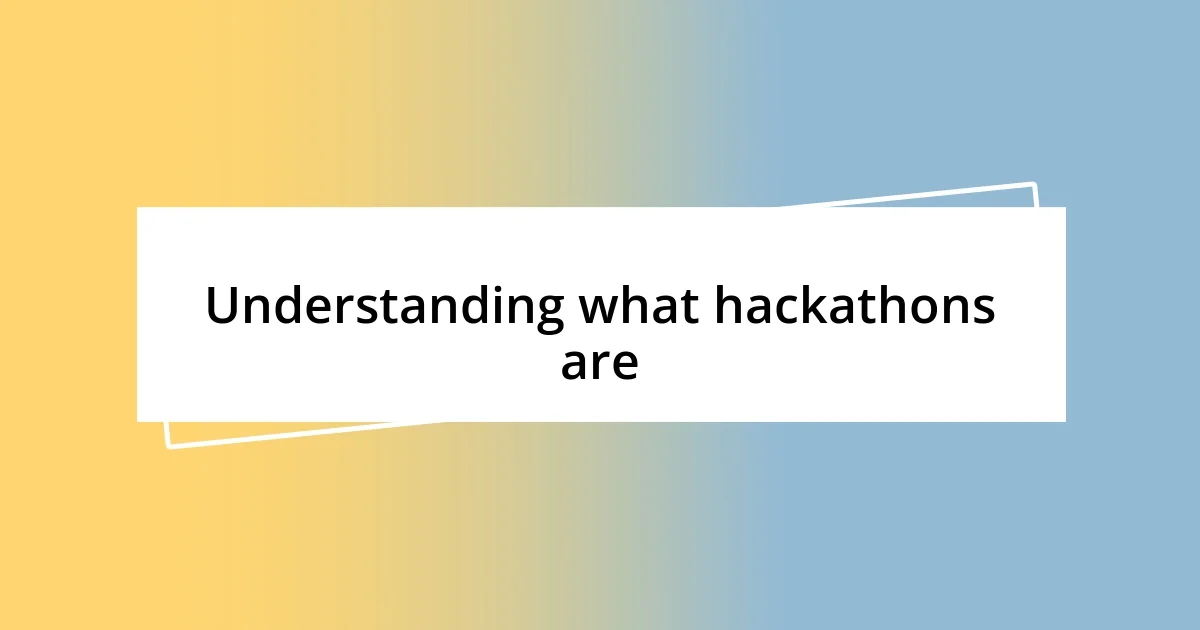
Understanding what hackathons are
Hackathons are intense, collaborative events where individuals come together to solve problems, create prototypes, or develop innovative solutions, typically within a limited timeframe—often just 24 to 48 hours. I remember my first hackathon vividly; the energy in the room was electric, with teams brainstorming ideas, coding furiously, and sharing snacks in a frantic but exhilarating race against the clock. Have you ever felt the rush of turning a spark of an idea into something tangible in just one weekend? It’s an incredible experience.
At a hackathon, participants can range from seasoned developers to complete novices, creating a unique environment of learning and collaboration. I once teamed up with a group of people who had diverse skill sets, ranging from design to coding, and it was magical to see how our different perspectives shaped our final project. This diversity not only fosters creativity but also breaks down barriers—how often do we get to work alongside individuals with completely different backgrounds in a high-pressure yet supportive setting?
While the focus is often on coding and technology, the heart of a hackathon lies in community and shared passion. I’ll never forget the moments spent talking with participants about our hobbies and aspirations in between coding sprints. Those connections often lead to lasting friendships, and sometimes even job opportunities. What makes a hackathon truly special is that it creates a space where you can push boundaries, learn from mistakes, and celebrate successes—all in a matter of a day or two. Isn’t that an exciting thought?
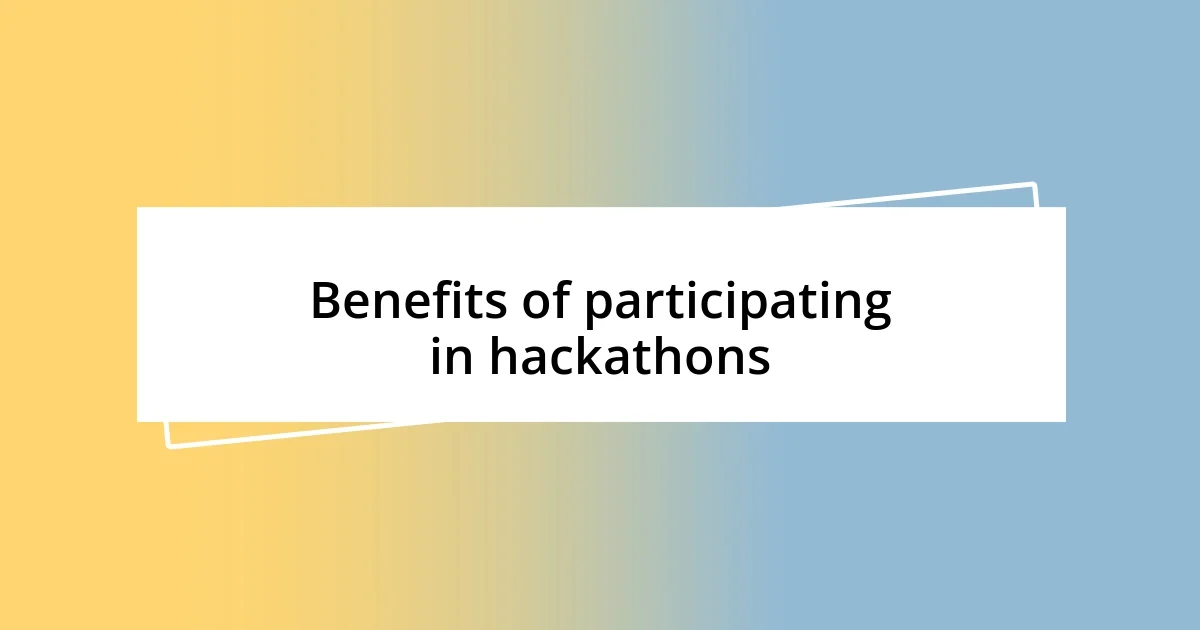
Benefits of participating in hackathons
Participating in hackathons has been one of the most rewarding experiences of my tech journey. The benefits of these events are nothing short of transformative. Beyond just enhancing technical skills, my creativity has skyrocketed as I navigated through brainstorming sessions. There’s something about the rush of working intensively with others towards a common goal that ignites an extraordinary sense of innovation in me.
Here are some key benefits I’ve experienced firsthand:
- Skill Development: Whether it’s learning a new programming language or mastering design tools, I always walk away with a deeper knowledge base.
- Networking Opportunities: I’ve connected with industry professionals and fellow enthusiasts, leading to collaborations and friendships that extend beyond the hackathon.
- Boosting Confidence: Completing a project in such a short timeframe is exhilarating—not just because of the outcome, but because it builds belief in my own capabilities.
- Problem-Solving Skills: Each challenge teaches me to think on my feet, pushing me to find solutions under pressure.
- Exposure to Diversity: Working alongside people from various backgrounds has opened my eyes to different ways of thinking and problem-solving, enriching the experience.
The energy of collaboration and creativity fuels passion in unexpected ways. I remember one hackathon where we hit a wall with our project. Instead of succumbing to frustration, we took a step back, shared a few laughs, and brainstormed together. That moment of levity led to a breakthrough that none of us expected. It’s that blend of hard work and camaraderie that transforms what could be a stressful experience into a joyous challenge.
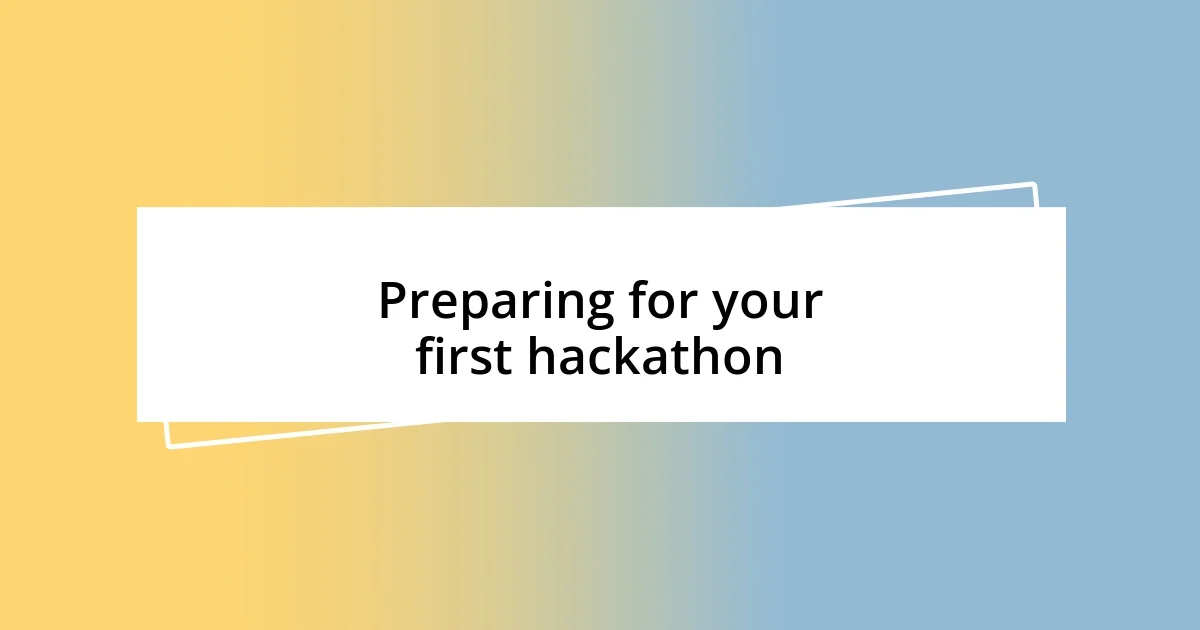
Preparing for your first hackathon
Preparing for your first hackathon can be both thrilling and daunting. I remember feeling a mix of excitement and nervousness the night before my first hackathon—juggling last-minute preparations while trying not to overthink everything. It’s essential to gather a toolkit of resources, whether that’s your laptop charged and ready or any coding languages you brush up on. Confidence can come from preparation, so dive into some tutorials or practice coding challenges in advance.
Don’t underestimate the power of networking, too. Before my first event, I reached out to a couple of friends who were experienced in the space. They offered valuable insights on team dynamics and the kind of project ideas to brainstorm. Engaging in conversations with other participants or joining hackathon forums can provide you with inspiration and tips that you’ll carry into the event. Having people to lean on for support can make a significant difference.
Lastly, set realistic expectations for yourself. I mistakenly thought I had to create a fully functioning product. Instead, I learned to focus on creating a solid prototype and storytelling around it. This shift in mindset allowed me to enjoy the event more and also helped me to make meaningful contributions. Remember, each hackathon is a learning journey; it’s about the experience just as much as the end product.
| Aspect | My Experience |
|---|---|
| Preparation | Gather tools, research coding languages |
| Networking | Talk to experienced friends and join forums |
| Expectations | Focus on prototypes, enjoy the learning process |
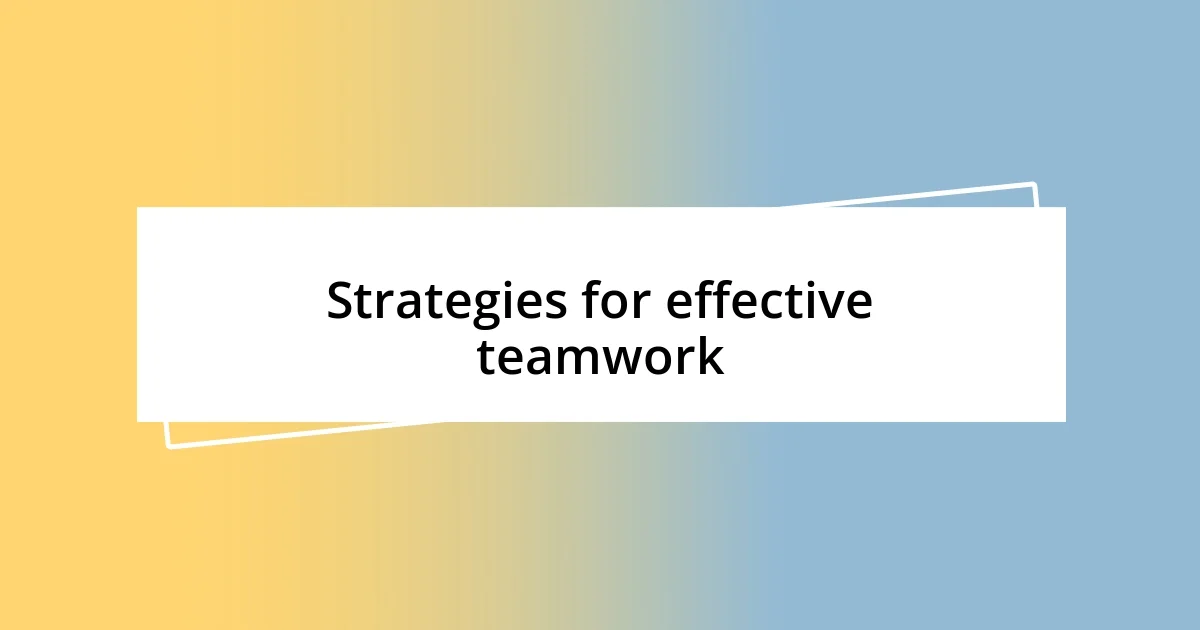
Strategies for effective teamwork
When it comes to effective teamwork in hackathons, communication is key. I remember a particular event where our team was struggling with just that. We had brilliant ideas but failed to articulate them clearly to one another, leading to frustration. To overcome this, we implemented short daily check-ins. This simple strategy not only ensured everyone was on the same page but also fostered a sense of solidarity that powered us through our challenges. Why do I emphasize check-ins? Because they not only clarify tasks but also build camaraderie.
Another important strategy I’ve found invaluable is leveraging each team member’s strengths. In one hackathon, we created a poster of everyone’s skills, interests, and ideas. It felt almost like a team relationship map. By recognizing what each person excels at, we could assign tasks that played to our strengths. This approach enhanced our productivity and kept motivation high. Have you ever noticed how much more engaged people are when they’re passionate about their contributions?
Moreover, maintaining a positive and open environment can dramatically influence team dynamics. I vividly recall a hackathon where our team faced setbacks and tension grew palpable. Instead of letting frustration fester, we made it a point to celebrate small victories, no matter how minor they seemed. This practice shifted the energy and kept our spirits buoyant. It’s essential to ask ourselves: how can positivity transform our work environment? From my experience, it not only makes the journey enjoyable but can also ignite creativity that leads to unexpected solutions.
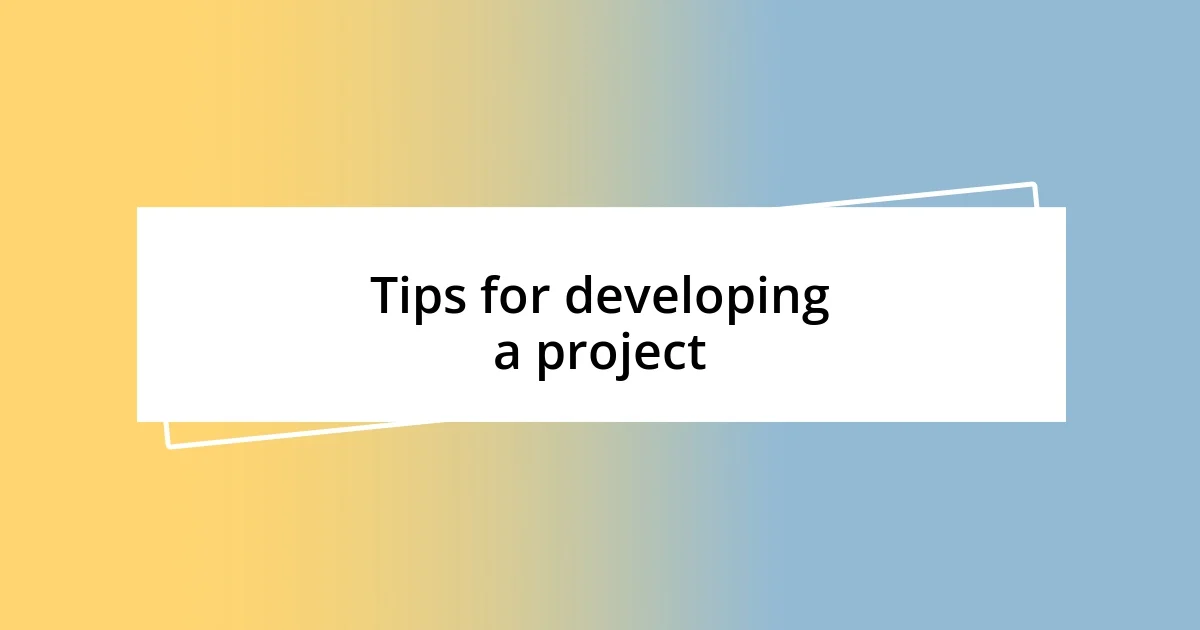
Tips for developing a project
When developing a project during a hackathon, it’s crucial to start with a clear idea or problem statement. I recall one hackathon where our team spent too much time brainstorming without focusing on a specific goal. Eventually, we decided to tackle a pressing issue: vandalism in public parks. Defining our project early on helped streamline our discussions and kept our energy directed towards creating a viable solution. Are you familiar with how much clarity can influence a project’s trajectory? I can assure you, it makes a world of difference.
Dividing tasks among team members based on skills can significantly enhance productivity. In my experience, we often made the mistake of taking on too much at once. By clearly delineating responsibilities—like assigning coding to those who were proficient and design to the creatives—we were able to cover more ground in a shorter time. I distinctly remember one teammate who was great at visual components but struggled with technical details. Empowering her to take charge of the presentation transformed her enthusiasm and ultimately elevated our project.
Iteration is another key aspect to keep in mind. I learned this the hard way when we spent hours perfecting one feature only to realize during testing that it didn’t resonate with users. Emphasizing rapid prototyping and getting feedback early on led to much more functional prototypes. Have you seen how feedback can shift a project’s direction? From my perspective, it’s like a compass that points you toward what really matters.
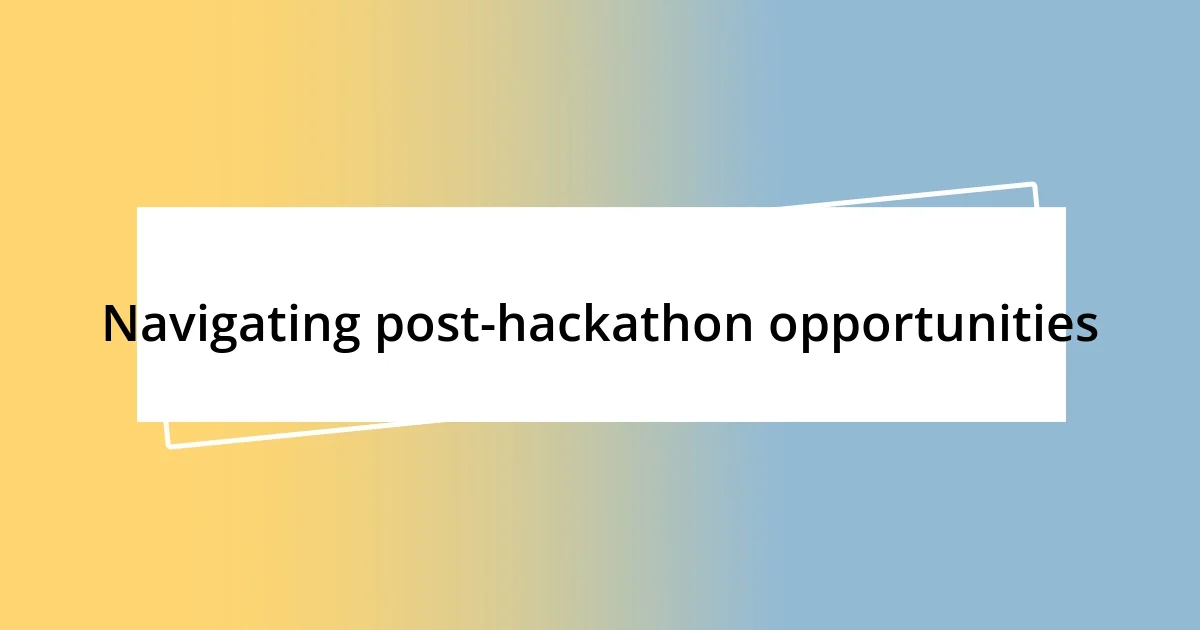
Navigating post-hackathon opportunities
After the intensity of a hackathon, I found myself excited yet somewhat lost about the next steps. One thing I’ve learned is that it’s essential to reflect on the experience immediately after it ends. I used to rush into follow-ups, but I now take time to jot down what worked well, what didn’t, and how I felt about the entire process. This reflection not only clarifies my own thoughts but also lays a solid foundation for any future projects. Have you ever found clarity in taking a moment to pause? You’ll be surprised at the insights waiting for you.
Networking post-hackathon can be a game-changer. I remember chatting with mentors and fellow participants after one event, picking their brains on different approaches and tools. It was in those informal conversations that I discovered opportunities for collaboration on new projects. The connections I made transformed into meaningful partnerships, leading to subsequent hackathons and even jobs. Why let potential collaborations slip away? Building those relationships can open doors you never knew existed.
Finally, sharing your project and journey on social media can amplify your visibility. After one hackathon, I decided to write a blog post detailing our process and outcomes. To my surprise, the post not only garnered feedback from my peers but caught the attention of industry professionals as well. I realized how powerful storytelling can be in showcasing skills and attracting future opportunities. How often do we overlook the value of sharing our narratives? From my experience, it’s an opportunity just waiting to be seized.
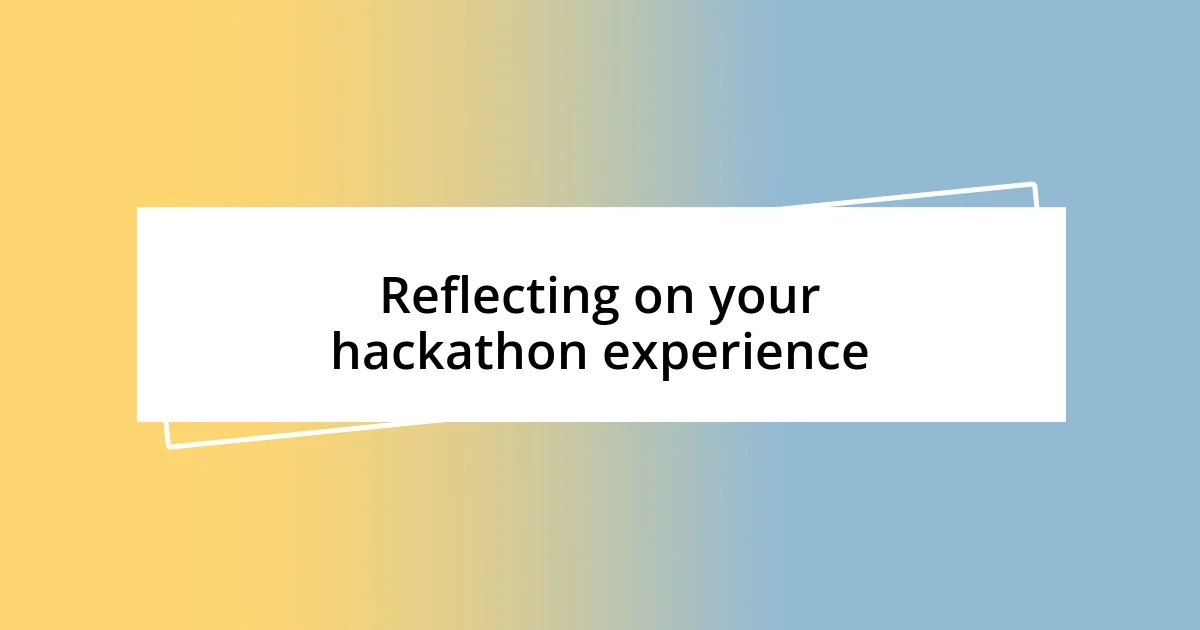
Reflecting on your hackathon experience
Reflecting on my hackathon experiences often brings a wave of mixed emotions. I vividly remember standing in front of my teammates after a particularly grueling 48 hours, feeling a mix of exhaustion and exhilaration. Those moments of reflection helped me identify my growth areas; I realized how much more I could contribute when I embraced vulnerability and shared my insecurities about coding. Have you ever felt that sense of relief when acknowledging your strengths and weaknesses with your team?
One crucial aspect I’ve learned is the importance of celebrating small wins throughout the hackathon. During my first hackathon, we wrongly assumed that only the final product mattered. However, I began to appreciate the little victories, like completing a challenging feature or successfully resolving a bug. Each small milestone built our team’s morale and fostered a supportive atmosphere. Have you noticed how recognizing progress can fuel motivation? It’s a strategy I employ to create positive momentum.
Lastly, I find that the lessons extend far beyond just coding or project management. The people I met and the stories shared have enriched my perspective. After one event, I stayed up late with a group of passionate individuals from diverse backgrounds, learning about their unique journeys. That night solidified my belief that hackathons are not just about tech but also about connections and shared aspirations. Have you ever felt that profound bond form when working alongside others towards a common goal? Those moments are what keep me returning to hackathons, eager for the next round of collaboration and discovery.










